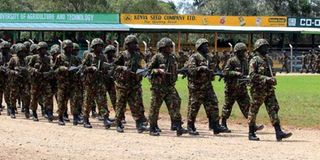Premium
Military has maintained a dignified distance from polls

KDF soldiers match during the last Madaraka Day celebrations in Nyeri. PHOTO | JOSEPH KANYI | NATION MEDIA GROUP
What you need to know:
- Successive regimes since independence have often misused the police to harass political opponents.
- Had the military taken sides, Kenya would have most probably gone the Syria way – into a prolonged costly civil war without clear victors.
- Under Mbugua’s leadership, the AP grew in numbers and in stature from an ill-equipped unit to become one of the best armed police units.
- Kibaki and Mr Odinga to a negotiation table which resulted in the formation of a coalition government with the latter as prime minister.
Never before has Kenya’s military been implicated in a plot to interfere with a General Election as Nasa alleged this week.
Successive regimes since independence have often misused the police to harass political opponents.
However, the military has always maintained a dignified distance from the political contests, thus winning the respect and pride of Kenyans who perceive it as one of the few trustworthy professionally run institutions.
But Nasa’s claims, backed by documents which the military spokesman Joseph Owuoth confirmed to be authentic only to be disowned on Saturday by Defence Cabinet Secretary Raychelle Omamo, threaten to soil this image that the military has cultivated for years.
OPPOSITION STRONGHOLDS
The accusations against the military echo the events of 10 years ago.
In the run-up to the 2007 General Election, President Mwai Kibaki deployed thousands of Administration Police officers to opposition strongholds to act as polling agents of his Party of National Unity which was facing a stiff challenge from Raila Odinga of the Orange Democratic Movement.
The AP was then headed by Mr Kinuthia Mbugua, the outgoing Nakuru County governor, who was considered one of the hardliners within the security services.
Under Mbugua’s leadership, the AP grew in numbers and in stature from an ill-equipped unit to become one of the best armed police units.
A few days to the December 27, 2007 polls, hundreds of APs were assembled in their headquarters in Embakasi, stripped of their uniform and job ID cards and transported at night by City Hoppa buses to opposition heartlands.
POLICE KILLED
The opposition, which had blown the whistle on the plan, urged their supporters to be on the lookout for the officers who had been sent to rural polling stations and were easily picked out by irate villagers who beat and killed some of them.
To the opposition, the deployment of the officers was another proof of the determination by President Kibaki and his close allies to win the election by any means and it contributed greatly to the violence that followed the announcement of the disputed presidential results.
Throughout the violence, even when the aggrieved ODM brigade was planning to swear in Mr Odinga as their president in a divided Kenya, the military kept its head proudly high above the fray, only coming out of their barracks to assist the police to clear blocked roads.
CIVIL WAR
Had the military taken sides, Kenya would have most probably gone the Syria way – into a prolonged costly civil war without clear victors.
Ironically, it has been long rumoured that it was a stern warning from the military top brass that they would intervene to end the post-election crisis which had claimed more than 1,100 lives that forced President Kibaki and Mr Odinga to a negotiation table which resulted in the formation of a coalition government with the latter as prime minister.
Even though there has been one major attempted coup and various plots since independence, the Kenyan military has over the years kept off any overt involvement in politics unlike their counterparts in many African countries.
But this does not mean there have been no incidents. On January 24, 1964, soldiers in Lanet barracks, Nakuru, and Kahawa in the outskirts of the city and in Lang'ata barracks had mutinied protesting against continued presence of white soldiers as senior officers.
PROTESTED
They also protested against poor pay. At the time, the soldiers had no interest in taking power but they were determined to have the civilian authority led by Mzee Jomo Kenyatta heard and acted upon.
Incidentally, President Kenyatta sought the help of Britain to quell the mutiny. Britain responded by sending 4,000 soldiers who quickly stabilised the situation.
Eleven of the 16 convicted leaders of the mutiny were sentenced to 14 years in jail each while three of the remainder were sentenced to 11 years and two to five years.
All 16 were dishonourably discharged from the military.
In 1971, a group of senior army officials were accused of organising a coup alongside a section of civilian leaders.
The plan did not succeed after some of the plotters went to Tanzania to seek support of Mwalimu Julius Nyerere who was the president then.
TANZANIA THREAT
Nyerere declined to assist them and told Kenyan officials of the plot. Soon after Kenya officials investigated the claims from Tanzania and found indeed plans were at advanced stages.
Those who were arrested included Gideon Mutiso, a Member of Parliament (Yatta), and a former army officer Daniel Owino. Army Commander Maj-Gen Joel Ndolo and Chief Justice Kitili Mwendwa were forced to resign by Mzee Kenyatta.
On August 1, 1982, a group of Kenya Airforce soldiers, led by Senior Private Hezekiah Ochuka, unsuccessfully tried to oust President Daniel Moi who had come to power in 1979 after the death of Mzee Jomo Kenyatta.
Also implicated in the coup attempt were opposition leader Jaramogi Oginga Odinga and his son Raila Odinga.
Private Ochuka was arrested in Tanzania where he fled to after the failed putsch, and was tried for treason and hanged in 1987.



